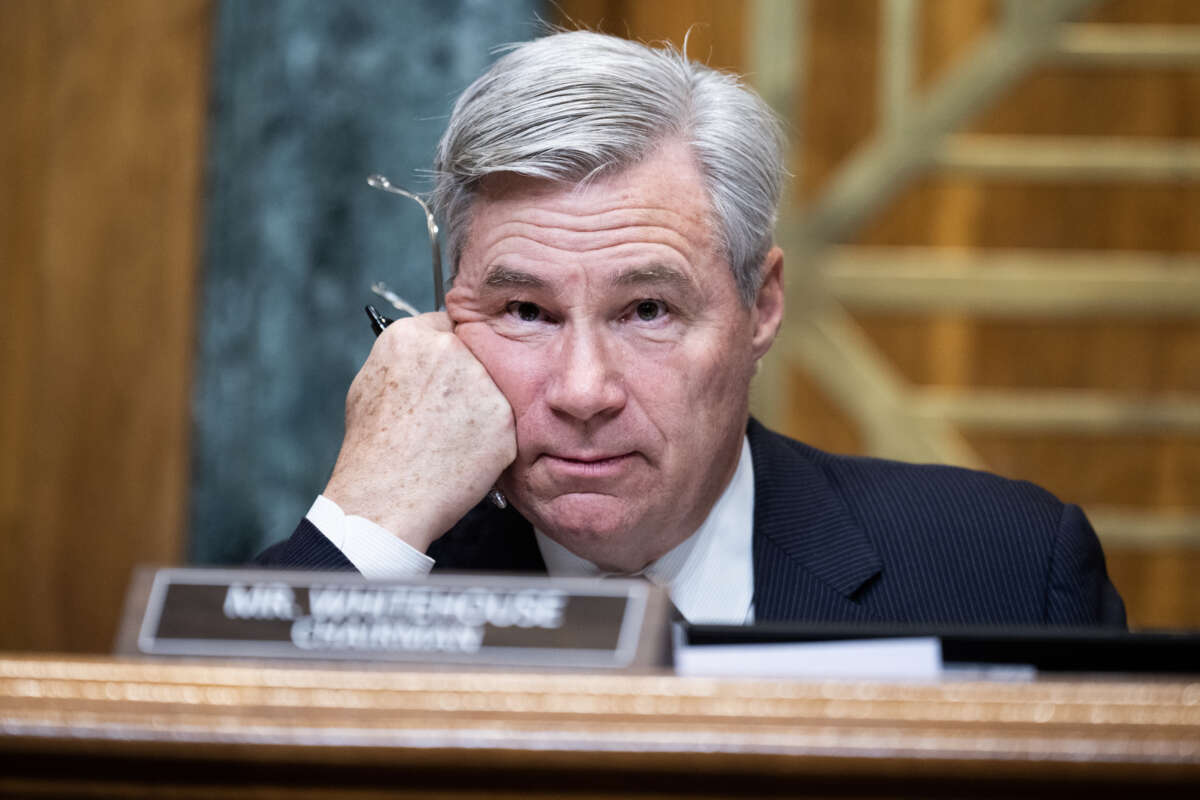As congressional Republicans unite around their plan to hold the economy hostage in order to advance their extremist debt limit package, some Democrats are pointing out that the vast majority of the bill is dedicated to favors for the fossil fuel industry.
Last week, the Senate Budget Committee held a hearing on the Limit, Save, Grow Act, dubbed the “Default on America” bill by Democrats. In the hearing, Budget Committee Chair Sheldon Whitehouse (D-Rhode Island) pointed out that a whopping 87 percent of the bill is comprised of “giveaways” for Big Oil, calling it a “field day for polluters.”
“The party’s funders, chief among them the fossil fuel industry, demand reward. And 275 of the 315 pages of the dirty ‘Default on America’ bill are devoted to giveaways to the fossil fuel industry,” Whitehouse said.
He went on to say that, within his and Senate Majority Leader Chuck Schumer’s (D-New York) bill to suspend the debt limit through the end of next year, “the section that would actually suspend the debt limit is 31 words.” He added, “the Senate should pass this bill immediately.”
The vast majority of House Majority Leader Kevin McCarthy’s (R-California) debt limit bill is indeed aimed directly at repealing climate initiatives and cementing the fossil fuel industry’s energy dominance for years to come.
The bill would repeal the vast majority of the Inflation Reduction Act (IRA), President Joe Biden’s climate bill. While not without its flaws, climate advocates say that the IRA is a crucial step toward addressing the climate crisis.
It would roll back a wide swath of provisions, including emissions credits for renewable energies and domestic sources for components of electric vehicles — as E&E News wrote last month, “anything new passed by the Inflation Reduction Act would be repealed by the Republican debt plan, even as the incentives have driven historic clean energy-related investment in red and rural districts.”
Also contained within the bill is the entirety of Republicans’ Lower Energy Costs Act, or H.R. 1. It includes major moves like severely watering down the National Environmental Policy Act in order to fasttrack fossil fuel infrastructure projects; reversing President Joe Biden’s revocation of the permit for Keystone XL and prohibiting presidents from banning fracking; and requiring the Department of Interior to hold lease sales for drilling on federal lands in a time when major institutions and climate scientists are saying that world powers must immediately halt new fossil fuel projects. Dozens of climate groups have come out against the bill.
Progressive lawmakers and climate advocates have pointed out that H.R. 1, a top priority for Republicans, may as well have been directly written by industry lobbyists, as similar proposals have been before. If it were, it would be no surprise: as a report by Accountable.US found last month, Republicans lifted talking points from the American Petroleum Institute verbatim as they debated the bill.
Though Biden has pledged to veto the Limit, Save, Grow Act — which passed the House last month — the fact that it is Republicans’ starting point for negotiations indicates the party’s priorities. The emphasis on fossil fuel favors is essentially the GOP’s shot across the bow: cut climate spending, or else risk an economic crisis and possibly a recession.
Join us in defending the truth before it’s too late
The future of independent journalism is uncertain, and the consequences of losing it are too grave to ignore. To ensure Truthout remains safe, strong, and free, we need to raise $31,000 in the next 48 hours. Every dollar raised goes directly toward the costs of producing news you can trust.
Please give what you can — because by supporting us with a tax-deductible donation, you’re not just preserving a source of news, you’re helping to safeguard what’s left of our democracy.
